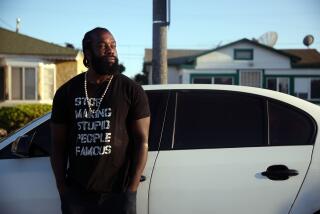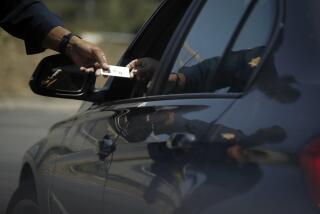‘Police Treat DWB as a Crime’
- Share via
An ACLU national advertisement campaign asks: “Should Driving While Black Be a Crime?” This ad is being run as Congress debates the merits of a bill introduced by Rep. John Conyers, (D-Mich.) that would require police to keep statistics on the race of motorists stopped and searched. Gov. Pete Wilson vetoed a state version of the traffic stops bill that had been introduced by Kevin Murray (D-Los Angeles), a black assemblyman who sued the Beverly Hills police after an officer stopped him and his fiancee in a Corvette last June.
Do black men, particularly those who drive expensive cars, feel that they are stopped unnecessarily by police? MARY REESE BOYKIN asked some black men about their experiences.
ANTHONY CLARK
Auto shop teacher, Inglewood High School
The license plate holder of my Jeep reads: (D.W.B.) Driving While Black Is Not Illegal. Blacks have talked about this all of our lives.
My license plate holder has become a conversation piece. Some give me a “be-serious look.” Others think it is cute. Some think it is a joke. But it is serious and it’s neither cute nor a joke. It is the reality that black men face. What surprises me is that people don’t realize that a large percentage of police procedural stops are people of color.
What really scares me is that my 19-year-old son has to deal with these police stops. He drives an old-model BMW. I resent what young men like him face. They are constantly told, “You fit the description of a suspect in the area.”
VERDELL RICHARDSON
Personal trainer, Los Angeles
Because I am big, police officers assume that I have been in the penitentiary. I have even had police officers pull me over and say, “There is no way that you can be that big without doing time.”
They pull us over, as black men, and ask for our drivers’ licenses and registrations. After we give it to them, they sit us in the back seat of their car, handcuffed. I have had officers search my car. They ask me, “Are you a Crip or a Blood?” I end up in a confrontation because I ask, “Are you in the Klan or a skinhead?”
With whites, officers ask for a license and registration. If the driver has broken the law, he gets a ticket and is let go in about 10 minutes. With black men, this ordeal takes 30 minutes to an hour because if nothing shows up while they run a check, the officers continue to check, believing something must be wrong with their equipment.
I don’t knock all of them, but many policemen are bullies. I have been stopped by a policeman who was riding solo, and before he could get out of the car to give me a ticket, his backup was there. In certain parts of South-Central, police ride four-deep. It really bothers them to know that they inspire no fear from many young black men on the street even though they come to the scene with their clubs, Mace, handcuffs, guns and ammunition. When they are off duty, they will not come to our neighborhoods because they are afraid of coming into contact with a black man who they know they have mistreated. The colors of their cars--black and white--that’s what it’s all about.
KEVIN MURRAY
Assemblyman
I introduced the California Traffic Stops Statistics Act because an inordinate number of African American men, including me, have been unnecessarily stopped by police. The underlying reason we are stopped so often is the perception that minorities are more likely to commit crimes and that warrants greater scrutiny of them.
It really has to do with police culture. If a black officer does it, it is still racism.
Most whites don’t think things like this happen anymore. Once, when a Sacramento television reporter questioned me about the severity of this problem, I asked him to ask other blacks--his cameraman, newsroom staff, people on the streets. People don’t think that racism is overt, but it is.
If an African American male drives a beat-up car, he is dealt with more harshly. If he drives a nice car, there is this feeling, “How did this black man get this nice car?” There are no rules; it happens all the time for a variety of reasons. The bottom line is that blacks are stopped more.
MICHAEL HALE
Self-employed, Los Angeles
Recently, I was stopped on Martin Luther King Boulevard near Crenshaw Boulevard. I was told that I had a defective taillight. There was a small crack on the side; the taillight was operable. It was 10 a.m. But I think that I was stopped just because of the car I was driving: a Mercedes-Benz. There is a perception that if a black man drives a nice car, he must be dealing drugs.
After I was stopped, I drove directly to the police station to complain.
I think that keeping statistics of who is stopped can be helpful if those statistics are utilized properly.
More to Read
Sign up for Essential California
The most important California stories and recommendations in your inbox every morning.
You may occasionally receive promotional content from the Los Angeles Times.













